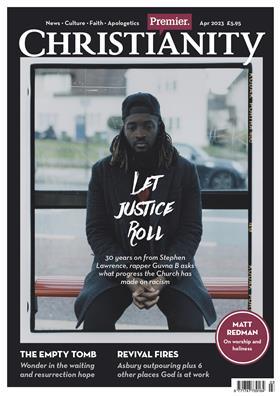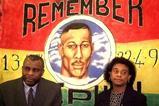As Britain marks 30 years since the racist killing of Stephen Lawrence, Richard Reddie highlights seven key points in continuing the fight for racial justice in our Church and in society

Stephen Lawrence was studying for his A Levels when he was attacked and killed by five white assailants in Eltham, south east London, on 22 April 1993. The Metropolitan Police’s subsequent investigation into catching his killers has become notorious for its incompetence, and led to the damning McPherson Report in 1999 which condemned the Met as “institutionally racist”.
That tragedy led to prolonged campaign for justice by the Lawrence family that eventually resulted in a change in British law regarding the rule on double jeopardy, and to the government passing the Race Relations (Amendment) Act (2000). Stephen’s death was a watershed moment for race relations in this country, and is often regarded as the barometer by which we judge matters of racial equity.
Racism still exists. Although the situation has undoubtedly improved, racial justice remains unfinished business
From a Christian perspective, the Lawrence case has been very instructive. At the time of Stephen’s death, the Lawrence family attended a Methodist church and, with that denomination’s support, as well as that from Churches Together in Britain and Ireland (CTBI), a justice campaign was launched to catch Stephen’s killers.
A lasting legacy
In response to the 30th anniversary of his murder, CTBI and Christian Aid recently brought together 14 Black, White and Asian Christians to discuss Stephen’s killing and its significance for race relations in Britain and Ireland.
The Stephen Lawrence Legacy Conversations are now available as a series of YouTube videos, and cover some of the most pressing and contentious religious and socio-cultural matters of our time. I would encourage everyone to watch the inspiring and challenging conversations.
Here’s seven key points from the discussions to help the Church better understand racial justice and be better equipped to effect it within their structures, as well as society.
1. God loves justice. He calls on his people to be just, and "to act justly and to love mercy and to walk humbly” with him (Micah 6:8). The Stephen Lawrence tragedy revolved around hatred, ignorance and violence – behaviours and attitudes that are sinful and run contrary to the Christian gospel of love, compassion and justice. All of our panellists used these paradigms as the foundation for their work to bring about racial equity.
More on Stephen Lawrence and racial justice
- Guvna B on racial justice and the Church
- 30 years on from Stephen Lawrence, Black Christians are still living with trauma
- The Stephen Lawrence murder was a watershed moment. Racial Justice Sunday is needed more than ever
- I’m not surprised by the Casey review, but I am still praying for change
- The fight for racial justice is tiring. Let this vision of the future spur you on
2. Don’t take ‘no’ for an answer. The Lawrence family’s long campaign for justice involved a battle with an obdurate criminal justice system. As two of our panellists pointed out, the Lawrences should be commended for their courage and resilience. As a result of their tirelessness, two of Stephen’s killers were convicted of his murder - 18 years after the crime - through a change in the double jeopardy laws that the family helped bring about.
3. This was not an isolated incident. As well as Stephen’s appalling murder, there were many other Black and Asian teenagers killed around the same time in racially-motivated attacks, including Roland Adams (1991), Ricky Reel (1997), Navid Sadiq (1992) and Rohit Duggal (1992). As Rev Dr David Wise pointed out, this was an era characterised by an unbridled racism that witnessed various acts of violence meted out against Black and Asian Britons, often with little or no consequences for the perpetrators.
4. Racism still exists. Although the situation has undoubtedly improved, racial justice remains unfinished business. While killings such as Stephen’s are no longer commonplace, they do occur. The police do, on the whole, respond more professionally in their investigations and liaise in a better way with the victims’ families. But racism is still prevalent in society and, sadly, in some churches, as evidenced by the numerous reports that have been carried out by churches, the government and other civil society groups in the wake of the murder of George Floyd in May 2020. Racism has the power to blight lives and livelihoods, and it still exists.
5. Christians must get involved. Racial justice should be everyone’s business, and not just the preserve of the usual suspects. If we truly worship a justice-focused God who calls on us to follow his example, Christians must be faithful to that call.
Stephen’s death has become a watershed moment for race relations in this country
6. Keep the spotlight on racial justice. Christians need to ensure that the current focus on racial justice stays on the agenda. There is a tendency for ‘watershed’ moments that result in a flurry of activity, reports and commissions, but the passing of time often sees a dissipation of action. To quote Rev Dr Martin Luther King Jr, we “take our eyes off the prize” of racial equity and lapse back into old, unhelpful ways.
7. Be thankful. Lastly, we need to thank God for the Black, White and Asian Christians who were standing up for racial justice (and what is right) at a time when it was unpopular to do so. One of the few positives from the death of George Floyd has been the opportunity for honest conversations on race. Prior to that, those who were encouraging churches to be more prophetic on these matters were often regarded as annoying at best, and troublemakers at worst. It is good that many are now receiving the credit that has previously been denied them.
Our videos feature some of these men and women; some of whom have been promoted to glory and never truly received the respect and thanks they deserved during their lifetimes. These conversations should also encourage Christians to support and pray for the new generation of racial justice champions, some of whom are also featured, and who will finish off the work.

The name “Stephen Lawrence” has now become a byword for racial justice and the importance of challenging bigotry and prejudice wherever it rears its ugly head. Let us pray that Christians continue to stand on the right side of history when it comes to standing up for justice, and against anything that thwarts it.
For more on this story, see the latest issue of Premier Christianity, which features a cover story by Guvna B reflecting on 30 years since the murder of Stephen Lawrence. Subscribe here






































No comments yet